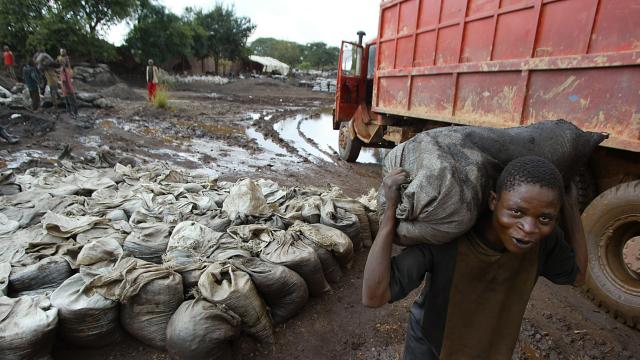The irony of transitioning to clean energy is we’re going to have to mine the crap out of the Earth to do it. Much like our computers and smartphones, wind turbines and solar panels are high-tech devices whose production demands a smattering of metals and minerals from across the periodic table and the planet.
That includes metals and minerals which, today, are sourced from parts of the world with unstable governments or where poor oversight leads to worker exploitation and violence.
A recent report warns that the clean energy transition could fuel the emergence of new conflicts over the mining of rare earths, cobalt, lithium, and a host of other much-needed raw materials — unless companies and governments take proactive steps to prevent that from happening.
Many of these materials are going to be hard to replace wholesale. We need rare earths, for instance, to produce the powerful magnets that drive modern wind turbines, while the high energy density of lithium for batteries makes it a favourite choice for electric vehicle manufacturers.
And until we get a lot better at recycling these metals, our main option is going to be mining them.
“This report was spurred on by conversations going on about the role of mining in a transition to a low carbon economy,” report co-author Clare Church of the International Institute for Sustainable Development told us. “We… noticed there was a gap regarding conservations about governance.”
To start to fill that gap the report identifies 23 key metals and minerals needed to build the green infrastructure of tomorrow, including wind turbines, solar panels, electric vehicles and batteries, all of which “are projected to increase in demand exponentially through 2050”.
The authors mapped established mining reserves for critical metals onto information about a state’s fragility and corruption to identify potential conflicts hotspots. “Conflict” can range from mining operations that finance militias to those using forced labour, exploiting workers, polluting communities, or fuelling local tensions over resources.
The bottom line? “Significant reserves” of all 23 crucial green metals and minerals are found in potential conflict hotspots, which are concentrated in South America, sub-Saharan Africa and Southeast Asia.
Some of those hotspots, such as the Democratic Republic of Congo (DRC), have already drawn international scrutiny for rampant human rights violations in their mining sectors, including the use of forced child labour at cobalt mines.
And yet the DRC’s cobalt reserves — an estimated 50 per cent of the global total — are only expected to become more important in the future, as companies such as Apple and Samsung that use the metal in their smartphones compete with demand from emerging sectors, such as the lithium ion battery industry.
Zimbabwe — home to one of the world’s largest reserves of lithium — is expected to see extraction ramp up in the coming years, raising concerns of future human rights abuses mirroring what’s happened at the country’s diamond mines. Rare earth metal mining, which is concentrated in China where it already takes a toxic toll on local communities, is expected to grow in part to meet demand from the wind energy sector. The list goes on and on.
None of this came as a surprise to David Abraham, senior fellow at the Institute for the Analysis of Global Security and an expert on the rare metal industry. “Conflict can kind of sneak up anywhere,” he told us, adding that every time we dig easy-to-access deposits of the ground, it creates additional scarcity, which can incentivise companies to turn to shadier sources.
Broadly speaking the issue is already on the tech industry’s radar, Abraham said, and companies such as Apple have taken steps to shore up their supply chains.
Church’s hope is that this report spurs the clean tech sector to get out ahead of future supply chain problems. It includes recommendations for the private sector and governments to help make the green energy transition more equitable, including increased supply chain transparency, more co-operation with artisanal small-scale mines, and a beefing up and expansion of existing regulations such as the EU’s 3TG laws (which ensure tin, tungsten, tantalum and gold sourced from the DRC don’t fuel armed conflict).
There’s no doubt a clean energy transition needs to happen in order to stave off climate change’s worst impacts. Let’s just hope it doesn’t come at the expense of some of the world’s most vulnerable workers and regions.
